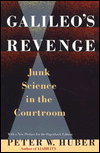Michael Fumento
Factual · Powerful · Original · Iconoclastic
Greedy Lawyers and 'Expert' Witnesses
October 09, 1991 · Michael Fumento · LawIn recent years, there has been much talk about a litigation explosion in this country. Why? Lawyers are greedy. Americans like a good fight. Litigants are pursuing a risk-free society.
Still, rare is the writer who can make a case for reining in lawyers that is fair, important and original. Such is Peter W. Huber, author of Galileo’s Revenge: Junk Science in the Courtroom, (Basic, 274 pages, $23). The worst part of the book is the title, catchy enough but with little relevance. For no one would be more horrified than poor Galileo himself at how some American lawyers have bastardized science to make a buck.
Mr. Huber’s indictment of the system as a whole falls on judges who bear ultimate responsibility for what takes place in their courtrooms, but it comes down more directly on "expert" witnesses and personal injury attorneys. For the right price, he writes, an expert witness will blame any injury on any deep pocket. Says one criminal and personal injury lawyer: "You get a professor who earns $60,000 a year and give him the opportunity to make a couple of hundred thousand dollars in his spare time and he will jump at the chance." Adds the lawyer, "They are like a bunch of hookers in June."

Some even operate out of bordellos of sorts. The Medical Legal Consulting Service of Rockville, Md., promises lawyers: "If the first doctor we refer doesn’t agree with your legal theory, we will provide you with the name of a second."
Yet there would be no prostitution without a steady supply of Johns. Galileo’s Revenge is replete with horror stories of products and defendants hounded, sometimes into oblivion, by unscrupulous attorneys with dreams of dollar-coated sugar plums dancing in their heads.
One example is that of Bendectin, a drug used since 1956 to prevent morning sickness during pregnancy. In October 1979, the National Enquirer, apparently prompted by the notorious litigator Melvin Belli, broke the story of "what could be far larger than the thalidomide horror," of "untold thousands of babies" born "with hideous birth defects."
Providing the "scientific" basis for the allegations against Bendectin were two obscure scientists who would again fall back into obscurity, though not before collecting huge expert-witness fees. In the worst incident in this feeding frenzy, a jury would award $95 million to the family of an alleged Bendectin victim (a decision later reversed), and the drug’s manufacturer, Merrell Dow Pharmaceuticals Inc., would agree to a $120 million class action settlement that was voided only because greedy plaintiffs’ attorneys thought they could make more on a case-by-case basis.
In the end, true science may catch up with junk science, in part because the professional colleagues of one of the two scientists has revealed that his work in that area was fraudulent. But Merrell Dow, tiring of the bad publicity and attorneys’ fees of upward of $100 million, has taken the expedient route and dropped the drug. It still faces legal action: Just this week, a court awarded $34 million to the parents of a girl born with birth defects after her mother took Bendectin._ The Journal of the American Medical Association_, meanwhile, has reported a doubling of hospitalizations due to morning sickness and concluded that as a result of the abandonment of the drug, "Birth defects may well increase."
While some may view such problems as simply part of the price of doing business, the ultimate victim, Mr. Huber notes, is the consumer. "Junk science verdicts raise prices, lower production, and deter consumption," he writes.
One defense of product liability litigation is that it serves as a deterrent to unscrupulous or careless businesses by punishing them for malfeasance. But, as Mr. Huber points out, the path-breaking scientific work in areas where there really were problems (occupational exposure to asbestos, the Dalkon Shield intrauterine device and the Ford Pinto, for instance), litigation began years after the problem was discovered and after corrective steps were taken.
What should be done? For one thing, Mr. Huber says, courts should apply to witnesses the same standards applied to defendants. "If people who really design cars or deliver babies are to be judged by professional standards in court, those who accuse them must be held to similar account."
But how? Mr. Huber notes that in modern times, "science in the West has been built up through collegiality and consensus," and then makes the questionable suggestion that peer-reviewed medical and science journals may serve this purpose. But, as with science in general, the medical and science journals, including the most prestigious, are being steadily politicized. At the current rate of decay, these journals may be, in a few years’ time, almost as much a haven for junk science as are American courtrooms today.
Still, his suggestion that American judges begin consulting their own experts, as they are allowed to do and as European judges routinely do, is certainly a realistic, effective counter to those who would solicit those June hookers.
